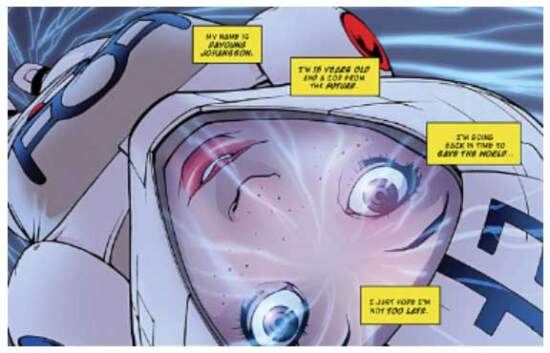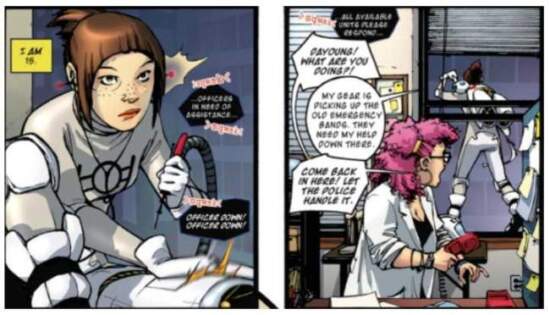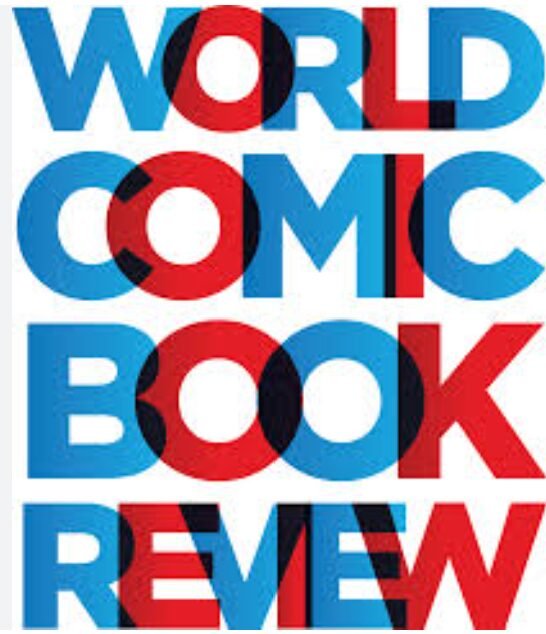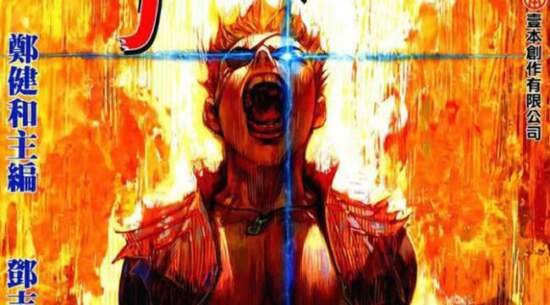Rocket Girl Volume 1
Written by Brandon Montclare
Publisher: Image Comics
Trade Paperback: October 2016
Science fiction novelist Poul Anderson has his Time Patrol books, in which time police destroys rogue fictional realities (a series of novels running from 1955 to 1995). Isaac Asimov’s The End of Eternity, from 1955 is very similar. More recently, in the comic book genre, Gerard Way’s The Umbrella Academy (Dark Horse Comics, 2007) has an agency which patrols time, but in context which is otherwise highly innovative. Is Rocket Girl new, or does it explore clichéd concepts from the 1950s? Reviewer Tom Kelly explores the title’s flaws.
Time travel can make for an interesting premise, particularly if the story involves changing a character’s past or future in some way as a consequence of the travel through time. This series from the American publisher Image Comics, Rocket Girl by Brandon Montclare, deals with a teenage girl named Dayoung Johansson.

Teen policing
Dayoung is a police officer in the New York Teen Police Department (NYTPD) from the year 2013 who travels back in time to 1986. Dayoung’s mission is to prevent a “crime against time”, committed by a corporation from her time, Quintum Mechanics, and which involved time travel from 2013 to 1986. The crime is a simple one: in 2013, Quintum Mechanics sent some form of technology back to itself in 1986, allowing Quintum to control a technologically-advanced New York City.

Dayoung is aware that preventing Quintum’s actions will erase the timeline Dayoung called home for the character’s entire life. Dayoung is fine with that. In Dayoung’s time, Quintum controls all aspects of daily life within New York City. While the city does have technology far in advance of the real world, Dayoung and her allies in the NYTPD feel that this action is necessary and perfectly within the NYTPD’s rights, even as Quintum security acts to stop them.
Mr Montclare has an interesting premise here, but the story lacks a good deal in execution. For example, why does New York City in this alternate future have a police force made up of teenagers? Dayoung is only fifteen years old. At two points in the initial story-arc are explanations given for why teenagers are police officers in this time. The first is the idea that teenagers are, unlike adults, believed to be incorruptible. Later, the reader is told that teenagers join the police force in order to gain the experience and training necessary to move on to Quintum Mechanics’ security force when the teenagers reach adulthood. As these two explanations do not seem to match, which one should the reader consider the real one? The contradiction suggests a lack of editorial oversight in continuity.
Dumb New World
Therein lies the problem with Rocket Girl. As presented, the book often appears haphazard and confusing. It does not help that few if any of the characters seem to be particularly intelligent. Dayoung appears in 1986 in her NYTPD uniform, a white bodysuit with a rocket pack. Dayoung immediately assumes anyone encountered will not only recognize the uniform but also the organization which authorises her conduct and the legal powers the character can exercise in the alternate future. At a hostage crisis, Dayoung flies in and starts issuing orders to uniformed police officers. The first two policemen she speaks to initially answer her questions, before wondering why anyone should do as the strange teenager requires . The officers wondered who Dayoung is, and, as Dayoung deals with the criminals the police had surrounded, the police officers decide to attempt to arrest Dayoung after the time-displaced police officer returns after successfully dealing with the hostage situation. Dayoung escapes arrest. Dayoung’s uniform and actions soon have characters in 1986 referring to Dayoung by the nickname “Rocket Girl.”

Furthermore, Dayoung expects other characters she interacts with to be as knowledgeable of her future and the science and technology of that era as a 2013 teenager would be. This is the writer endeavouring to educate a contemporary audience, but it is a clumsily-executed technique. Dayoung’s very low expectations for the intelligence of others is reminiscent of Ford Prefect’s berating of Arthur Dent’s education in the late Douglas Adams’ novel A Hitchhiker’s Guide to the Galaxy, only Mr. Montclare does not possess Mr. Adams’ skillset for humour .
Dayoung is not a superhero, exercising a conscience in altruistic deeds. Dayoung is instead somewhat mindless in her mission: she wants to arrest the responsible parties without knowing who those individuals might be, or what the technology sent from the future might be. Mr. Montclare suggests the technology might be Dayoung’s own rocket pack, as Dayoung’s attempts to travel back in time appeared to be initially thwarted by a pair of Quintum Mechanics security guards. Mr. Montclare then reveals it was the security guards who sent Dayoung back in time to 1986, but before any Quintum Mechanics personnel are dispatched to 1986, for reasons unexplained.
How did Dayoung, unconscious at the time the character was sent back in time, awaken and become alert in the character’s initial appearance in 1986? When did Dayoung perform the heroic actions that gained her the “Rocket Girl” nickname? Will the reader care? Even if the time travel-related plot mechanisms of the book work, the characters themselves are not overly interesting. The young physicists at the 1986 Quintim Mechanics who take Dayoung in seem to be too scattered and confused. The villains at the 2013 Quantum Mechanics are literally faceless, unidentified in any way for the reader as they converse with each other in a clichéd way from the shadows.
Writers endeavouring to successfully use teen vernacular is a perennial problem in comic books, within the broader issue of cloned dialogue. Looking solely at US publisher DC Comics, up until the 1990s, all of its superheroes had more or less interchangeable dialogue. The examples that stand out in a bad way were when writers tried to sound like teenagers – for example, the earliest Teen Titans adventures did, or worse, the character of Snapper Carr in the original issues of Justice League of America. Those were instances of middle aged writers actually trying to use teenage slang and failing miserably on so many levels. But in Rocket Girl, we face the former scenario, not the later. The problem with dialogue for Rocket Girl is not that the title character did not sound like a fifteen year old. It was that she sounded like every other character in the story.
Timed Out
The general understanding of time travel in fiction usually comes down to whether or not time travel can change the past. Most stories say yes, notably in the movie Back to the Future, but there are some that say no. Writer Garth Ennis considered this in Midnighter (Volume 1, 2015) for DC Comics/Wildstorm (a title we have reviewed): the title character is coerced into going back in time to kill Adolf Hitler, but found he could not when he laid eyes on his target and saw Hitler as a sad, broken man not worth the effort. At that point a “time cop” (for want of a better expression) intervenes to tell Midnighter that everyone who has tried to kill Hitler by way of time travel makes the same conclusion and so does not do it. The American science fiction television show Babylon Five has time traveled a handful of times to the future, but the conceptual underpinning is that the future is already as written as the past, so nothing can be changed.
Rocket Girl falls squarely in the former category. The character can and perhaps does change the future. What seems to be missing is the why. Is she that idealistic? Her co-workers in the Teen Police Force seem to agree with her, even though it would erase them from existence. Perhaps the title is meant to use the old cliches and perhaps work them with a younger audience book. The writer does or did some work with Marvel Comics’s Moon Girl and Devil Dinosaur (see our recent review of issue 27), which is aimed at younger readers and is a much better comic. What we see of the title character’s home environment looks like a shiny sci-fi utopia, aside from some poorly defined bad guys in a board room who are literally standing in the shadows unidentified. Even a cliched story can work with likable characters and fun twists, but Rocket Girl does not have either. Its characters are poorly defined and the plot reads like stories that have been many times over.
Ideally, reading an ongoing series in trade paperback form gives the reader a greater appreciation for the story. Instead, due to the internal inconsistencies and a lack of truly sympathetic characters, the reader may not be interested in going much further at all. Had any of the characters, particularly Dayoung, displayed a bit more intelligence or the supporting characters been a bit more interesting as people, then Rocket Girl could make for a much more interesting read.



